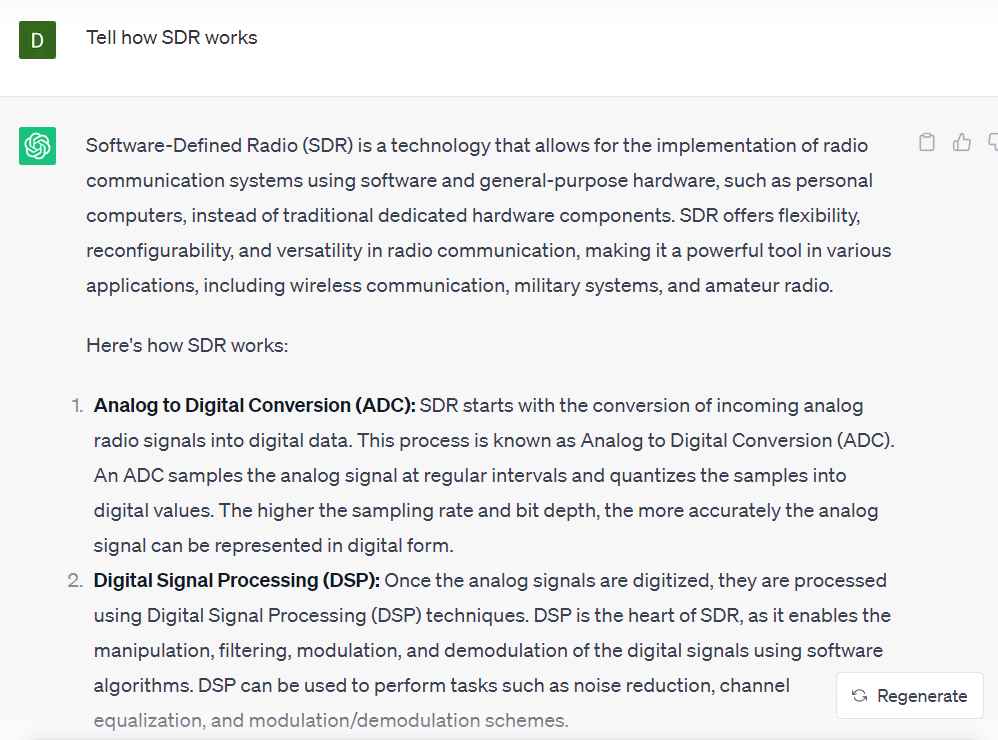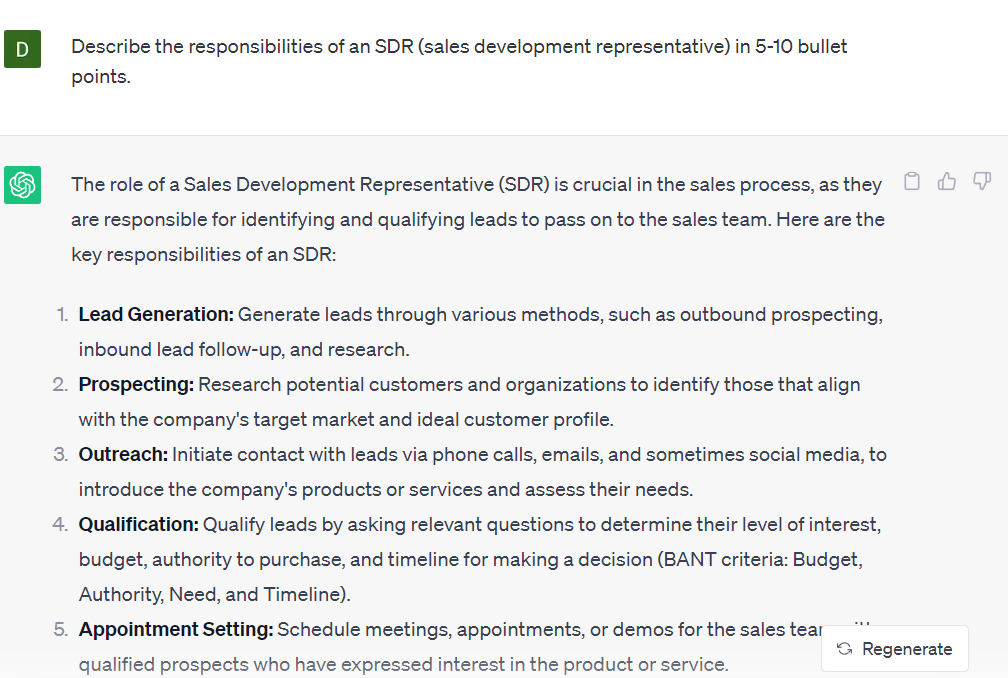The Power of Precision: Writing Prompts for Generative AI Excellence for Sales

Not a fan of AI writing an essay instead of a short email? Check out how you can fine-tune it for sales
Generative AI is transforming industries, with sales and marketing in the top four areas that are likely to feel the most impact. This is no surprise since AI can automate lead generation, messaging, and content creation, saving time and increasing customer engagement. In fact, AI technology could boost sales productivity by 3-5% of current global expenditures.
If you want to keep up with the competition, it’s a good idea to learn how to use generative AI for sales effectively. We’ll go over why prompts matter, the basic rules of working with generative AI tools for sales like AiSDR, and useful tips to master the art of prompting and using AI like a pro.
Why is a good generative AI prompt essential?
An AI prompt is your instruction to an artificial intelligence system to generate content, ideas, or solutions. It tells AI what you want it to do and how you want your request to be fulfilled.
With this in mind, it’s pretty easy to figure out why a high-quality prompt is essential for generating a good AI output. The better you explain what you want, the more easily AI can give it to you.
Think of generative AI sales prompts as instructions for a new employee with zero work experience. It’s unreasonable to expect good results if you give the employee a task and leave them to figure out how to do it. Instead, for AI to perform well, your instructions must be clear, concise, and informative.
This means that if you want to get the most out of generative AI for sales and push more customers to book demos, you have to know how to craft a good prompt.
What does a good generative AI prompt for sales need?
If you’re new to generative AI, it’s tempting to give up if you keep getting poor results. In fact, by focusing on just three things, you can already secure much better and more reliable outputs.
Clarity and focus
This is the first rule of a good AI prompt: Even a 5th grader should be able to understand your request. This means your request should contain:
- Clear and concise language
- No vague words and phrases like “interesting,” “beautiful,” or “nice”
- One prompt for each issue (don’t enter your whole sales outline in one prompt)
- Informative but short sentences
- Good grammar
- Enough details to explain your request without confusing the tool with pages of specifics
- No unnecessary abbreviations or jargon (provide explanations when necessary)
If you ignore these components, here’s a potential response you might get when asking AI to explain the responsibilities of a sales development representative (SDR):

With just a few tweaks, you can get much better results. Here’s an example:

Context
Context is also key. AI can easily adjust tone and language to meet your needs, but only if it knows what those needs are.
Let’s say you’d like to generate a prospecting email for a language school for children. Even though you’ve used the best prospecting tools to qualify leads and collect data, you’ll fail if you ask, “Write a prospecting email to promote a language school.” Without any context to work with, ChatGPT gives this result:

Even though ChatGPT came up with a passable prospecting email, you’ll need to rewrite the entire message to fit the tone for the target audience — parents who want to send their children to language lessons. You can avoid this extra work by including these details in your prompt:
- Target audience
- Purpose
- Tone
- Language
- Intended message
Here’s an example of this approach in action.

And now if you hit generate, you should get a much better result than your first attempt.

As you can see, the new email is completely different. Aside from being a lot less ‘dry’, it includes emojis and other components that should help the email resonate with the reader.
Depending on your audience, the potential drawback to this email is that it’s probably too long for most readers.
Fortunately, there’s an easy fix: You can actually give ChatGPT a hard cap regarding the number of words (e.g. “Length: No more than 100 words”). ChatGPT will then regenerate the email and make it fit the word count restriction.
You can also configure AI to follow certain email frameworks like ACCA or Justin Michael.
Desired outcome
The third strategy is to let AI know exactly what you expect regarding the type of content and why you need it. For example, you can use a prompt such as this one. All you need to do is replace the words in brackets with your own:
Write me a [100-word] [sales email] to [welcome a new lead] and [encourage them to explore our services].
Of course, you’ll need to add further details for more personalization. But a simple prompt like this ensures that AI will use the appropriate format, content, and length for your task. Without this information, you’ll spend more time rewriting general outputs into serviceable emails.
How is a good generative AI prompt for sales written?
If you don’t yet have an AI tool like AiSDR to automate your sales copy and other pipeline processes, these basics for prompt writing will get you started. However, to get a perfect generative AI prompt for sales, adjust it by following the next tips.
Focus on customer pain points
Every salesperson knows that sales is about identifying and addressing customer pain points. For better performance, AI needs this information as well. You can include it like this:

Bonus tip: If you don’t know your customer’s pain points, you can ask AI, but its ideas will be generic. You can either collect data from your leads and customers for analysis with AI-based sales automation tools, or you can copy and paste a lead’s website into AI and have it generate pain points based on the website copy.
Incorporate benefits and solutions
Once AI knows your customer’s pain points, you can push it to highlight your product’s solutions and benefits for a customer. You can do this in two ways:
- Add the product benefits you want to highlight to the prompt. This works well if you have specific numbers to emphasize, like this:

- Alternatively, you can describe product features and let AI decide what to highlight. In this case, you’ll get an email like this one:

Use persuasive language
You can help AI write more engaging content by including these in your prompt:
- Action-oriented verbs like “explain” or “convince”
- Target emotions, such as “Highlight the happiness and relief of employees that don’t need to deal with mundane tasks”
- Appeal to company and customer values
- Product or service benefits
- Persuasive tone
Add personalization
Personalization is key to sales. McKinsey research suggests that 76% of customers are more likely to buy from businesses that personalize their experience, and such companies have the potential to generate 40% more revenue.
Adding personal details to your prompt will make the output more catchy and engaging. You can ask AI to mention that you’ve seen a company’s relevant LinkedIn post or add anything else that shows your lead or customer you care. For example, AiSDR AI can create a personalized nurturing sequence for each lead based on collected data to work with their objections.
Remember that many tools — especially free ones like Chat GPT 3.5 — collect and use information to develop their model, so avoid including confidential information.
Provide examples of previously successful sales prompts
Examples help people understand you better, and it works the same way for generative AI. If you give your tool an example you like, the chances of getting a good result are much higher.
Try tweaking a prompt that’s worked well, or use a well-crafted pitch or email from a previous case and specify what you want to change.
Avoid these common pitfalls
Some mistakes can ruin even the best-crafted prompts. Before you hit send, make sure you’ve checked for these common prompt pitfalls:
- Vague language and lack of focus – As we’ve seen, these can easily mislead AI and give you poor results.
- Bias and stereotypes – Ensure your prompt uses inclusive language and that your draft output does the same.
- Leading questions – These questions force AI to bluff about something it doesn’t know with fake facts or statistics. This doesn’t mean you shouldn’t ask questions, but don’t force AI to answer. When in doubt, you can ask your tool if its answer is factually accurate, and it will tell you.
Dedicating a few extra minutes to double-check if you’ve avoided these pitfalls will help you achieve more efficient results.
These simple tips can help you improve prompts in most cases. Just remember to combine them with basic rules to keep prompts simple but informative, and you’ll be able to uncover the full potential of AI for sales.
Elevate your sales game with powerful AI prompt-writing
You don’t need magic powers to get good results from generative AI in sales — only an understanding of the main limitations and how to overcome them. Great generative AI prompts for sales should:
- Be clear and comprehensive
- Include proper context
- Describe a clear outcome
- Focus on addressing customer pain points and solutions
- Use persuasive language and personalization
Following these basic rules can create more engaging and personalized sales materials that resonate with your audience and boost your conversion rates. On top of that, if you find that you’re reusing the same sections of prompts over and over, you can cache them to reduce your overall AI costs.
If you need an even more streamlined approach, you can automate your sales pipeline with AiSDR. Our AI sales tool automates mundane tasks such as sales prospecting and data collection, saving you time and delivering faster results.
Book a demo with AiSDR to experience the power of fully AI-supported sales.
FAQ
What are good prompts?
A good AI prompt is clear, specific, and tailored. It gives the AI tool all the information and context it needs to generate a focused response. For example, “Write a 150-word email newsletter for subscribers to a tech blog to promote the [new custom development service] to managers and CEOs of startups.”
More advanced prompt engineering techniques include prompt chains and chunking.
What is the best use of ChatGPT for sales?
You can use ChatGPT and similar artificial intelligence tools in sales to:
- Research your target industries and buyer personas
- Promote sales team members on social media
- Create compelling cold outreach messages
- Develop effective lead-qualifying questions
- Perform rapid competitive analysis
- Synthesize key points from sales calls
For the best result, combine different tools to cover the whole sales process or find a solution with all these functions included.
Can generative AI increase sales?
You can use AI to increase sales, as it helps personalize marketing content, build an automated sales funnel, and provide data-driven insights to optimize sales strategies. This lets you engage customers more effectively and streamline processes to drive revenue growth.
What is the best generative AI prompt for sales?
The best generative AI prompt for sales is clear, specific, and actionable. It includes examples and context, such as the target audience, their pain points, and your product or service benefits. For example, “Write a 150-word email newsletter for subscribers to a tech blog to promote the [new custom development service]. Use data on the pain points stated in the previous message and solution description from the site [link]. Finish an email with a CTA.”












